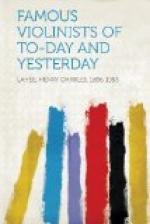His next appointment was to the private band of Napoleon, after which he travelled for three years in Russia with the violoncello player Lemare, earning great fame.
Returning to Paris, he established concerts for chamber music, which proved successful, and built up for him a reputation as an unrivalled quartet player. He travelled again, visiting Holland, Belgium, and England, and then he became leader of the opera band in Paris and of the royal band. He made a final tour in Switzerland in 1833, and died in 1842.
Baillot is considered to have been the last distinguished representative of the great classical school of violin playing in Paris. In his “L’Art du Violon” he points out the chief distinction between the old and the modern style of violin playing to be the absence of the dramatic element in the former, and its predominance in the latter, thus enabling the executive art to follow the progress marked out by the composer, and to bring out the powerful contrasts and enlarged ideas of the modern musical compositions. After the time of Baillot and his contemporaries the style of Paganini became predominant in Paris, but the influence of the Paris school extended to Germany, where Spohr must be considered the direct descendant artistically of Viotti and Rode.
Perhaps the most illustrious pupil of Viotti was Pierre Rode, who was born at Bordeaux in 1774, and exhibited such exceptional talent that at the age of sixteen he was one of the violins at the Theatre Feydeau in Paris. He had made his debut in Paris at the Theatre de Monsieur, when he played Viotti’s thirteenth concerto with complete success. In 1794 he began to travel, and made a tour through Holland and North Germany, visiting England, driven there by stress of weather, on his way home. He appeared once in London, and then left for Holland and Germany again. On his return to France he was appointed professor of the violin at the Conservatoire, then newly established. In 1799 ne made a trip to Spain, where he met Boccherini. The following year he returned to Paris, where he was made solo violinist to the First Consul, and it was at this period that he gained his greatest success, when he played with Kreutzer a duo concertante of the latter’s composition. After this he went to Russia, where he was enthusiastically received, and was appointed one of the emperor’s musicians. The life in Russia, however, overtaxing his strength, from that time his powers began to fail, and he met with many disappointments. In 1814 he married, and, although he made an unsuccessful attempt to renew his public career, he may be said to have retired. He died at Bordeaux in 1830.
Of Rode’s playing in his best days we are told that he displayed all the best qualities of a grand, noble, pure, and thoroughly musical style. His intonation was perfect, his tone large and pure, and boldness, vigour, deep and tender feeling characterised his performances. In fact he was no mere virtuoso but a true artist. His musical nature shows itself in his compositions, which are thoroughly suited to the nature of the violin, and have a noble, dignified character and considerable charm of melody, though they show only moderate creative power. He had few pupils, but his influence through his example during his travels, and through his compositions, was very great indeed.




